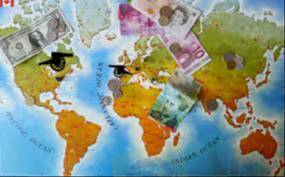
2025-02-11 17:23
IndustryCURRENCY WARS AND COMPETITIVE DEVALUATIONS
#firstdealofthenewyearastylz
1. Understanding Currency Wars
A currency war occurs when countries intentionally devalue their currencies to gain a competitive advantage in international trade. This is often done through monetary policies like lowering interest rates or direct market interventions. The goal is to make exports cheaper and imports more expensive, thereby boosting domestic production and economic growth.
2. What is Competitive Devaluation?
Competitive devaluation is when multiple countries deliberately weaken their currencies in response to each other, leading to a cycle of devaluations. This can create economic instability, as it may lead to inflation, capital flight, and trade imbalances.
3. Causes of Currency Wars and Devaluations
Export Competitiveness: Countries devalue their currencies to make exports cheaper and more attractive in global markets.
Trade Imbalances: Nations with trade deficits may devalue to reduce imports and encourage local production.
Economic Stimulus: Lower currency values can boost inflation, reducing debt burdens and stimulating spending.
Monetary Policy Differences: Countries with low interest rates often see their currencies weaken, prompting competitive responses from trade partners.
4. Historical Examples
1930s Great Depression: Countries abandoned the gold standard and devalued their currencies to revive economic growth.
1990s Asian Financial Crisis: Countries like Thailand, Indonesia, and South Korea faced forced devaluations due to financial instability.
2008 Global Financial Crisis: Central banks, including the U.S. Federal Reserve, implemented quantitative easing, leading to accusations of currency manipulation.
U.S.–China Trade War (2018–2019): China was accused of devaluing the yuan to offset U.S. tariffs.
5. Consequences of Currency Wars
Short-Term Trade Benefits: Weaker currencies make exports competitive, boosting economic activity.
Inflation Risks: Devaluations increase import costs, leading to inflation.
Financial Market Volatility: Investors may pull capital from devaluing economies, causing financial instability.
Retaliatory Policies: Countries may impose tariffs or capital controls in response, leading to trade tensions.
6. How Governments and Institutions Respond
Foreign Exchange Interventions: Central banks may buy or sell currencies to stabilize exchange rates.
Monetary Policy Adjustments: Raising interest rates can strengthen a currency but may slow economic growth.
International Cooperation: Institutions like the International Monetary Fund (IMF) and World Trade Organization (WTO) mediate conflicts and promote fair trade practices.
7. Conclusion
Currency wars and competitive devaluations are double-edged swords. While they may provide short-term economic relief, they can also trigger inflation, financial instability, and global economic conflicts. A balanced approach that considers both domestic economic growth and international trade stability is essential to avoid prolonged financial turmoil.
Like 0

Son of Abraham
Brokers
Hot content
Industry
Event-A comment a day,Keep rewards worthy up to$27
Industry
Nigeria Event Giveaway-Win₦5000 Mobilephone Credit
Industry
Nigeria Event Giveaway-Win ₦2500 MobilePhoneCredit
Industry
South Africa Event-Come&Win 240ZAR Phone Credit
Industry
Nigeria Event-Discuss Forex&Win2500NGN PhoneCredit
Industry
[Nigeria Event]Discuss&win 2500 Naira Phone Credit
Forum category

Platform

Exhibition

Agent

Recruitment

EA

Industry

Market

Index
CURRENCY WARS AND COMPETITIVE DEVALUATIONS
 Hong Kong | 2025-02-11 17:23
Hong Kong | 2025-02-11 17:23#firstdealofthenewyearastylz
1. Understanding Currency Wars
A currency war occurs when countries intentionally devalue their currencies to gain a competitive advantage in international trade. This is often done through monetary policies like lowering interest rates or direct market interventions. The goal is to make exports cheaper and imports more expensive, thereby boosting domestic production and economic growth.
2. What is Competitive Devaluation?
Competitive devaluation is when multiple countries deliberately weaken their currencies in response to each other, leading to a cycle of devaluations. This can create economic instability, as it may lead to inflation, capital flight, and trade imbalances.
3. Causes of Currency Wars and Devaluations
Export Competitiveness: Countries devalue their currencies to make exports cheaper and more attractive in global markets.
Trade Imbalances: Nations with trade deficits may devalue to reduce imports and encourage local production.
Economic Stimulus: Lower currency values can boost inflation, reducing debt burdens and stimulating spending.
Monetary Policy Differences: Countries with low interest rates often see their currencies weaken, prompting competitive responses from trade partners.
4. Historical Examples
1930s Great Depression: Countries abandoned the gold standard and devalued their currencies to revive economic growth.
1990s Asian Financial Crisis: Countries like Thailand, Indonesia, and South Korea faced forced devaluations due to financial instability.
2008 Global Financial Crisis: Central banks, including the U.S. Federal Reserve, implemented quantitative easing, leading to accusations of currency manipulation.
U.S.–China Trade War (2018–2019): China was accused of devaluing the yuan to offset U.S. tariffs.
5. Consequences of Currency Wars
Short-Term Trade Benefits: Weaker currencies make exports competitive, boosting economic activity.
Inflation Risks: Devaluations increase import costs, leading to inflation.
Financial Market Volatility: Investors may pull capital from devaluing economies, causing financial instability.
Retaliatory Policies: Countries may impose tariffs or capital controls in response, leading to trade tensions.
6. How Governments and Institutions Respond
Foreign Exchange Interventions: Central banks may buy or sell currencies to stabilize exchange rates.
Monetary Policy Adjustments: Raising interest rates can strengthen a currency but may slow economic growth.
International Cooperation: Institutions like the International Monetary Fund (IMF) and World Trade Organization (WTO) mediate conflicts and promote fair trade practices.
7. Conclusion
Currency wars and competitive devaluations are double-edged swords. While they may provide short-term economic relief, they can also trigger inflation, financial instability, and global economic conflicts. A balanced approach that considers both domestic economic growth and international trade stability is essential to avoid prolonged financial turmoil.
Like 0
I want to comment, too
Submit
0Comments

There is no comment yet. Make the first one.

Submit
There is no comment yet. Make the first one.